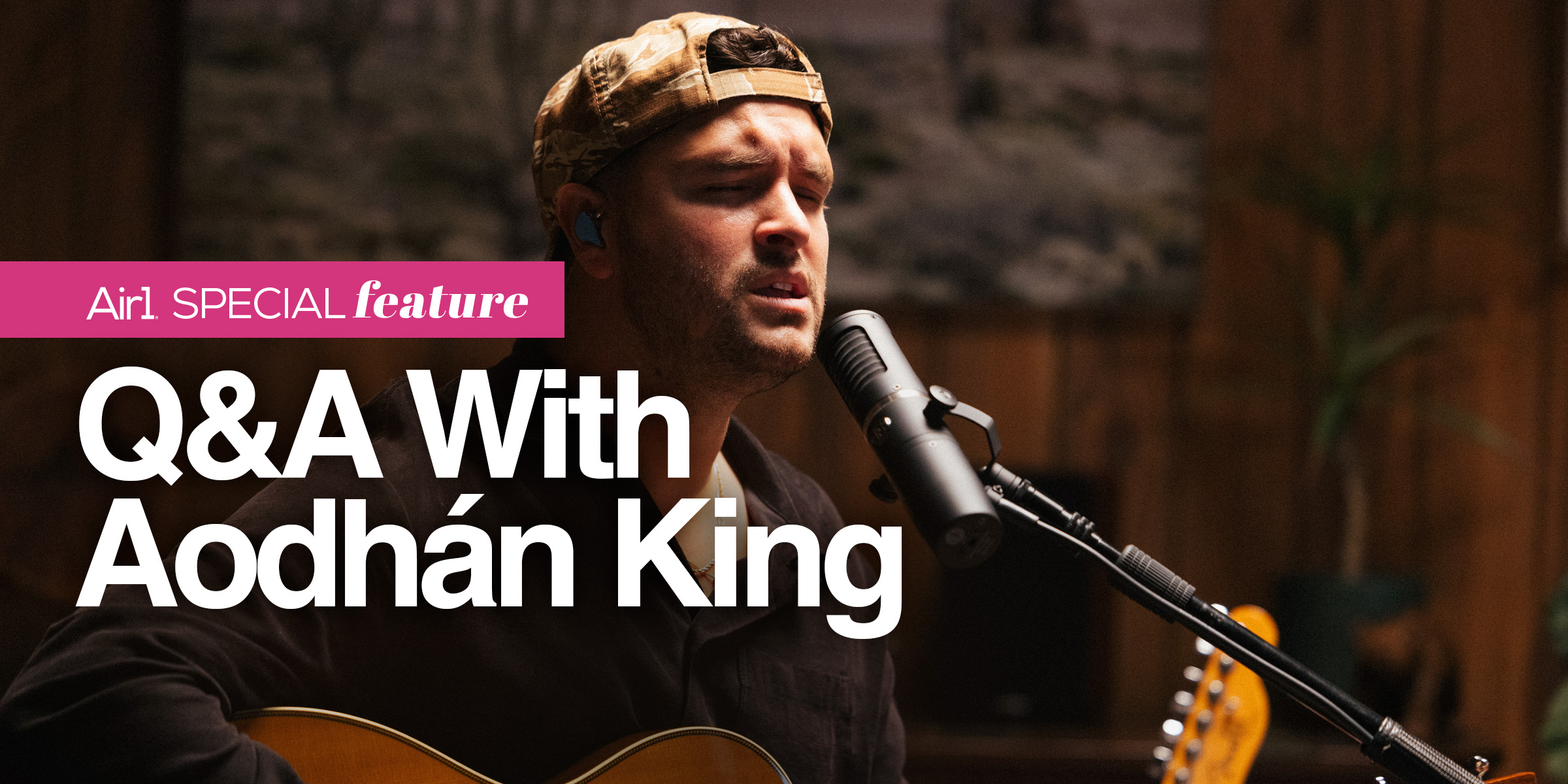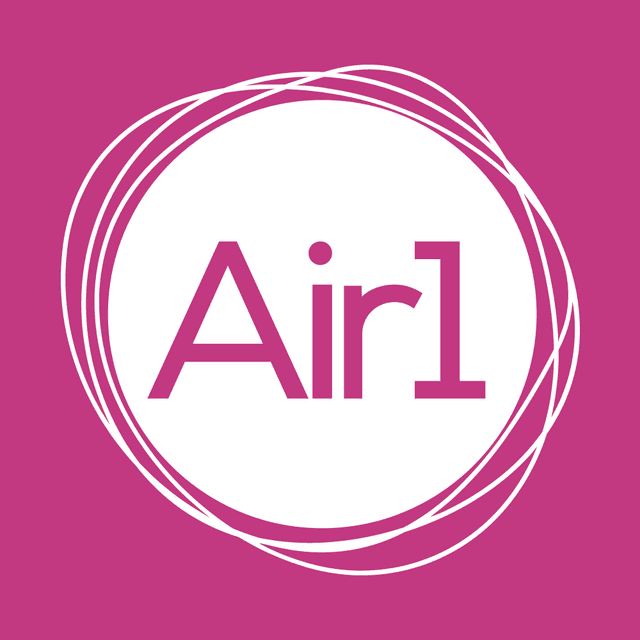
After more than a decade with GRAMMY®-nominated collective Young & Free, Aodhán King spread his wings and bowed his first solo endeavor in 2024. In addition, the Australian-born musician moved to America, settling on the West Coast. His debut, “Beyond Us,” boasts writing contributions from numerous longtime friends and fellow Aussies, as well as some unexpected features that include rising acts and mainstream names alike. Following a surprise EP at the top of the year, the “Thank You So Much, Jesus” singer has a new project in the works with Abbie Gamboa, further proving that collaboration will continue to be a cornerstone of his artistry.
During a recent trip to Nashville, King stopped by the Air1 Studios to film a handful of exclusive performances, highlighting songs from “Beyond Us.” He was kind enough to sit down for a chat in the green room afterwards where he shared the scariest part of forging a career apart from a group, how LANY’s Paul Klein was almost a part of Young & Free and why Pat Barrett should be your first call in a crisis.
RELATED CONTENT: Exclusive Performance: 'Thank You So Much Jesus' Aodhán King
Air1: The transition from being a part of a successful, well-known group like Young & Free to going solo is a big leap. What scared you the most about stepping out on your own?
Aodhán: I think when I was part of Young & Free, it was such a collaborative experience. There was so much going on in the life of the church that, at a certain point, you feel like your whole life is laid out before you. You’ve got this event, then this conference, and then you’re going on this tour; and you don’t have much say in a lot of it. You can kind of predict what your next year will look like very easily. And so then I go into a solo career, and I’m like, “Oh, wait. Now I have all the control over what I do.” And so that was definitely a big change and something I was leery of when I did make the jump to doing my own thing. I had to become more decisive. I had to become really clear in what I wanted to do and why I was doing it. But I don’t think I was scared so much as I was excited to embrace a different season. I’d been involved with Young & Free for so long, and it was amazing to collaborate with all the guys and feel that our wins were collective; but our losses also felt collective. We wore that together.
Air1: Did starting that solo journey prompt your move to America?
Aodhán: I had been talking about doing the move for a long time. With Young & Free, we were spending so much of the year here anyway; so I think I made that decision before [the pandemic]. I was committed to moving to America, but I think a big reason I’ve stayed is because of what I’m doing. With my solo stuff, it makes sense for me to be here.
RELATED CONTENT: Aodhán King & Lauren Daigle Make Beautiful Music Together on ‘Time’
Air1: How often do you get back to Sydney to see your family?
Aodhán: I try to go once or twice a year. I try to spend Christmas there. So when it’s Christmas here, it’s summer in Australia. I go back for a month or two then.
Air1: How has writing for a solo project been different than writing for Young & Free?
Aodhán: I think the process is very similar, but the way I view writing and all the songs is different. With Young & Free, we had a really specific goal to write songs for our youth group on a Friday night. We were asking: What do young people, who are going through what all teenagers go through, what do they want to say? What are the faith statements they need to be declaring over their lives? It was really specific; and so at a certain point, even for the guys involved in Young & Free, it was getting harder and harder to relate, because we’re not 15 anymore. But it kept us really laser-focused on what the songs needed to do. I think the freedom I’ve found in doing my own thing has been through the fact that there’s no boxes. I can just sing about what God’s doing in my life, and that’s been pretty amazing because it’s given me new language to say what I wouldn’t have said before.
RELATED CONTENT: Album Spotlight: ‘Beyond Us’ Aodhán King
Air1: “Thank You So Much, Jesus” with Paul Klein has become an Air1 favorite. How did you and Paul originally connect?
Aodhán: So we met many years ago. Probably going back to 2013, right at the beginning of when Young & Free started, a friend of mine was like, “Hey, you need to write with this guy named Paul. You should write with him for Young & Free.” LANY, his band, hadn’t started yet. He was kind of just on the brink of that. He was leading worship at a church in LA. And so we met up; we wrote a song. At the time, I was like, this could be a really cool way to have someone who’s based in America who could be traveling or writing with us, producing music with us. And so we wrote a bunch of songs, and then within six months, LANY kind of just took off out of nowhere. And so his life changed dramatically. He was traveling all the time, but we stayed really close. Over the years, I’ve written a bunch of songs with him for LANY, but he was like, “I’d love to write a worship song.” When I started to do this record, a lot of my friends were so encouraging to be like, “Hey, you should definitely make a worship record. Make a record that feels like you.” A lot of those friends, like Paul, were voices in pushing toward that. And I was like, let’s do it, Paul. So we wrote a song, and the next day he FaceTimed me, and he’s like, “Hey, I don’t know how to say this, but I feel like I have to sing this song with you.” He’s always wanted to record a worship song. I mean, he loves worship music and he loves God; and so I think for him, this felt like the right avenue. I was not expecting that. This was right at the beginning of me starting to work on my solo record. I think it was one of the first songs that I wrote, and it kind of became a pillar for me.
Air1: Which LANY songs have you co-written?
Aodhán: We’ve written a bunch in years past, but it was stuff that we never put out. We wrote a song called “Alonica,” which is on LANY’s last record [“a beautiful blur”], and then we have a song we wrote for his next record.
Air1: In addition to Paul Klein, Lauren Daigle is featured on your new album, but there are a few other female voices that aren’t as familiar. How did you connect with them? Were they friends as well?
Aodhán: So everyone on the record I have friendships with, which was really intentional. I think the way I wanted to soften that landing from being in a huge community, a church family, to being on my own was to bring in my friends. That’s why the record’s so collaborative. And so Griff, who’s on “Yesterday, Today, & Tomorrow,” I knew through [church], and we had written a lot as well over the years. Then, Hannah Joy [“How Can It Be?”] is in a band called Middle Kids, which is one of Australia’s bigger indie acts. Their band’s unbelievable, and I’ve always admired them. I didn’t know them. I didn’t know they were Christians. And a couple years ago, I got a message from one of the guys in the band. He was like, “Hey, man, we’re in LA. I’d love to come to church. Do you have a good church in LA?” So we went to church, and then we connected over the years and wrote a bunch together.
Air1: Do you have a favorite moment from recording this album?
Aodhán: That’s a good question. There were so many moments. I think one of my favorite moments was on Christmas Eve. We had this orchestra in Budapest play on a few songs. “Time” with Lauren [Daigle] was one of them. Before we added strings, that song was really empty; it was kind of just piano and an SPD drum kit. We watched the orchestra play it on a livestream. They’re really strict on the time they allot you. I think they gave us 60 minutes on the dot, and there’s a countdown clock. The moment it hits that number, they have to put everything down. So you have to get it right in the moment. That was a cool experience.
Air1: You were recently on tour with Pat Barrett. What did you learn from Pat during your time on the road with him?
Aodhán: I think Pat is such an amazing person. He makes everything so fun, and he is just magnetic. I love Pat. His energy and his positivity was something that I needed to glean from. There’s a lot of things that went wrong on that tour, a lot of production problems. Our first night, we all got stuck in Chicago. All our gear was stuck there. And so, we get to the venue [in Canada], and there’s nothing on the stage, literally nothing. Pat just rallied everyone to keep a positive attitude. He started putting out messages on his Instagram, being like, “Hey, if anyone’s in Ottawa and you have a guitar, can you please bring it?” And all these random people are rocking up to the church with all these different instruments. So Pat was able to get everything and pretty much pull off a full show. It was crazy. And we’re talking at 5 p.m., and the doors opened at 5:30 p.m. Most people would just go, “We don’t have anything. We have to cancel.” But Pat, he was like, “We’ll figure it out.”





